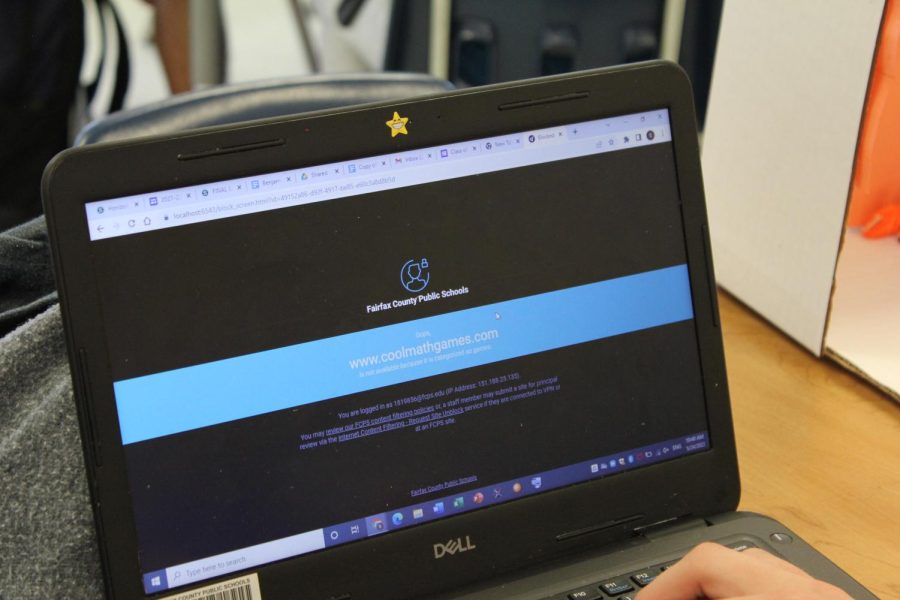FCPS’ Recent Website Restrictions Cause More Harm Than Good
Students and teachers report frustration after being blocked out of questionably flagged websites and Youtube.
Won’t connect: A student receives a familiar error message after encountering a blocked site.
May 31, 2022
Throughout my four years of John R. Lewis High School, students and staff were provided with technology and student computers to improve our learning. Though we were given supplies to make learning easier, there have been many complaints about the strict limitations on students’ access to websites here at John R. Lewis High School due to FCPS’ firewall.
At the start of this school year, the school decided to restrict some websites, including YouTube (unless a parent has signed permission), to prevent students from distractions and cheating through exams while on FCPS campuses. Though this sounds like a good idea on paper, it brought an obstacle to students continuing projects and completing common, daily classwork. Many students are left unhappy, as those who heavily rely on the school computers to finish assignments face limits to their research.
Senior Ana Ribeiro has had negative experiences with the YouTube restriction regulation. “It’s definitely excessive. For example, I take genetics and forensic science, so we need to learn about real crimes. Sometimes my teacher wants to do documentaries, and they’re all blocked [on YouTube], and she has to pay for every single documentary that we need to learn about for our curriculum–out of her pocket. And that’s really, really bad,” Ribeiro said.
The website restrictions stop students from their primary assignments and stop students from learning in their desired electives, and senior Thea Nguyen feels the frustration.
“I never understood why they would restrict us because it’s also restricting us from some of the sources that we might need for projects or future activities,” Nguyen said.
Senior Thea Nguyen who took four years of digital art, speaks about her recent experiences with website restrictions.
“I think the hardest part was, once again, the restricting of software that we use as well, so, at home, we had to use resources from home for digital art, because we can’t use the resources here at school. We had to download the programs, but even with that, there were so many issues,” Nguyen said.
Because of the laptop’s outdated models, the devices cannot catch up with the constant updates from the Adobe software provided to Lewis High School.
“And for some reason, our laptops, even when they’re on home Wi-Fi, are STILL restricted from certain things, which is so weird,” Nguyen said.
This conflict became especially critical during the beginning of the 2021-2022 school year. As students were introduced to the new do and don’ts with suspicious websites, they were also introduced to the new policy of YouTube. Instead of using this well-known social media platform, they were asked to have permission from parents with a two-step confirmation process to be able to watch videos for desired classes.
Throughout the year, many students continue not to have access to YouTube and are limited in their work from accessing information due to strict website restrictions.
Teachers, like Digital Art teacher Brenda Perry, share the frustration when trying to share video content with students.
“I can understand why the school district blocks certain websites, but it’s not always accurate,” Perry said.
Perry explains her experience with the limitations of websites. “For example, I had a lot of problems with my Digital Art classes trying to access certain materials. Whether it be on YouTube or other websites, we’re often using it to build up animations or videos, but because they’re categorized, somehow, under gaming, they are blocked, and therefore that really throws a wrench in my lesson plans,” Perry said.
Throughout our interview, Perry explained the tricky process of gaining approval from the school to access a website to resume her classes.
“I have to go through a lot of [trouble] just to open up the websites and have to justify why I’m using it, and then it has to go all the way to the central office and get approved by the principal. Then, a week later, after I have to redo all my lesson plans and have my students do other types of work, we can finally access that particular content or websites,” Perry said.
While it is still manageable to continue working by using some limited alternatives, we should not ignore the problems students and staff face in order to learn through technology. To better the lessons for students, all websites should be studied further before categorizing them as “gaming” or “inappropriate.” FCPS students and staff should speak up to bring awareness to this unnecessary firewall.


hi • Feb 21, 2025 at 9:23 am
No one likes fcps’s firewall.
Mia Carranza • Oct 6, 2022 at 11:08 am
I don’t even go to you guys school and we are dealing with the same thing over at Westfield except over here it was blocked out of nowhere. I need this stuff to do research for essay and such and they keep blocking more and more